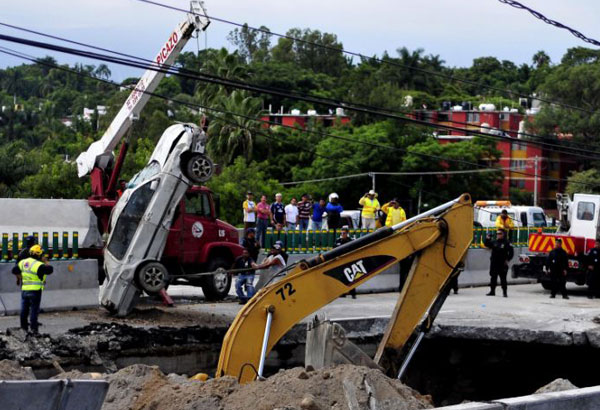Mexican highway sinkhole that killed 2 exposes corruption

FILE - In this July 12, 2017 file photo, rescue workers use a crane to lift a vehicle that drove into a sinkhole on a highway in Cuernavaca, Mexico, where a father and son were killed when the deep sinkhole swallowed their car. The highway connecting Mexico City and the Pacific coast resort of Acapulco had only recently been redone and was still festooned with inaugural banners proclaiming, “Thank you, Mr. President!” for the project. (AP Photo/Tony Rivera, File)
MEXICO CITY — When a car carrying a father and son plunged into a giant sinkhole that opened on a highway in central Mexico, it caused Mexicans to shudder, not just at the men's agonizing deaths, but at the corruption, shoddy work and dubious government contracts it exposed.
The highway connecting Mexico City and the Pacific coast resort of Acapulco had only recently been redone and was still festooned with inaugural banners proclaiming "Thank you, Mr. President!" for the project.
The government quickly removed the banners and fired a few low-ranking officials, while the federal highway department rushed to blame heavy rainfall, not shoddy construction, for the tragedy last week in which the men slowly asphyxiated at the bottom of the sinkhole over the span of an hour and a half.
But it soon emerged that multiple local officials had warned of serious problems with the highway construction and audits found overpayments to contractors who did the work, leading one anti-corruption expert to call what happened "the same movie we've seen before" when it comes to Mexican infrastructure projects.
"The difference is that here there was a tragedy, there were deaths. But the irregularities seen here are the kind of thing that is seen constantly in this type of work," said Raul Olmos, a researcher for the nonprofit group Mexicans Against Corruption.
Documents show local officials from at least three agencies in nearby Cuernavaca, just south of Mexico's capital, had repeatedly warned federal officials that a decades-old drain conduit under the new highway was woefully insufficient, prone to blockage and in danger of overflowing.
Juan Carlos Valencia, the head of the Morelos state water commission, had warned the transportation department about problems at the spot, where a gully and storm drain cross under the highway. "The drain that carries water from the gully isn't big enough to handle the water," Valencia wrote.
Transportation officials responded that the drain had functioned well for 40 years and they saw no reason to replace it.
The warnings couldn't have been clearer as local officials watched the water eat a hole in the containment wall supporting the highway. It was getting bigger with each passing rainstorm.
Just two weeks before the highway collapsed, a low-level Cuernavaca official, Mario Meneses, hand-delivered a letter to the transportation department. "I am telling you that the wall you built in this area is about to collapse," it said.
On June 27 the head of the state civil defense office, Francisco Bermudez, held a meeting with the transportation department's local representative.
"We made a presentation for him with a video showing point by point what the problem was," Bermudez said. "On July 9 it rained again and the hole got deeper. We called them again and they started repair work, but on the 12th it rained again and they didn't have time."
In the pre-dawn hours of July 12, part of the containment wall gave way, washing away the highway's foundations and collapsing a section of roadway that created a gaping hole that swallowed Juan Mena and his father as they were headed to work at a food plant.
In the aftermath of the disaster, the head of the transportation department, Gerardo Ruiz Esparza, said he had never been told of the warnings and defended the work done on the highway. He blamed unusually heavy rains for the sinkhole and said relatives of the dead men would be paid $56,000 in compensation.
But it soon came to light that the two companies that did the bulk of the project — the expansion of an existing highway that raised the road levels significantly — had little experience in similar projects. They won the contract by submitting the lowest bid, but ended up going way over budget, more than doubling the cost of the project by the time it was finished in March.
The two firms, Aldesa and Epccor, said the drainage tunnel failed because of "an excess of garbage and an extraordinary accumulation of water due to intense rain." They said the drainage pre-dated the project and was not part of the work they performed.
Olmos said "low-balling" contract bids in anticipation of racking up additional charges for "unforeseen" work is a common corrupt practice in Mexico.
In the case of the highway project, audits showed the government had paid contractors for work they didn't do, or paid them more than they were owed. And officials with one of the firms involved, Epccor, had ties to a construction company that had been barred from government contracts for improper practices in the past.
Mexico has some of the most expensive highway tolls in the world, in part because of construction cost overruns and suspiciously generous contracts for private companies that build or operate highways under concessions.
The highway, rail and mass transit sector has been a magnet for corruption because of the huge budgets, weak or non-existent bidding processes and lack of accountability.
Olmos said his group has documented a network of cronyism in federal highway contracts that could reach all the way to the president's close associates.
"There is trafficking of insider information that allows some construction companies to gain an advantage over other competing bidders," Olmos said. "This is constant."
- Latest
- Trending
































